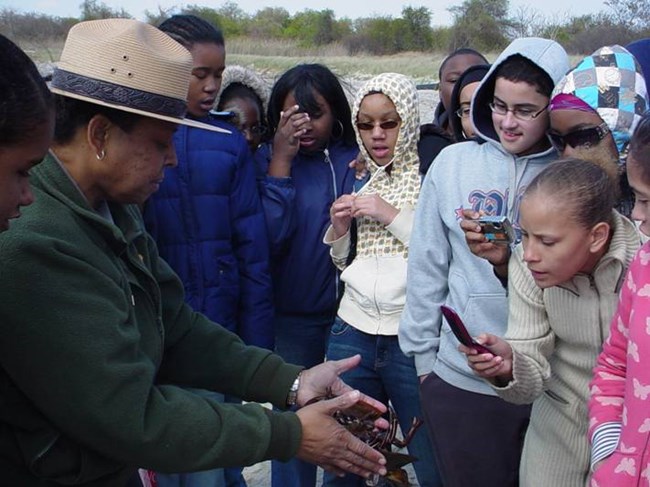
NPS PHOTO Jamaica Bay's resources can help teach your students The following NPS and outside resources are provided to assist educators in their classroom teaching and in more effectively using this park and the National Park System as teaching tools.
Since 1974, the Environmental Education Advisory Council (EEAC) has promoted, supported and advocated for outstanding formal and informal environmental education in New York City and beyond. It serves as a network and advisory group for all committed to EE to grow professionally and to share ideas and information. Through its membership, monthly meetings, website, newsletter, member programs and other resources, EEAC provides a wide range of services to the education community.
Established in 1968, the New York State Outdoor Education Association is the leading professional group supporting outdoor and environmental education in New York State. Its mission is to promote interdisciplinary life-long learning in, for and about the outdoors. Its membership includes classroom teachers, informal educators, naturalists, academics and others.
The Science Council of New York City (SCONYC) is a coordinating group for ten science education organizations servicing teachers in K-12 public, parochial and private schools throughout the city. Their mission is to help teachers in their professional growth in science teaching. SCONYC holds an excellent day-long conference and exhibition for educators each year, scheduled in 2008 for April 12th at Stuyvesant High School in Lower Manhattan.
The mission of the Environmental Protection Agency is to protect human health and the environment. Since 1970, EPA has been working for a cleaner, healthier environment for the American people. Educator resources include lesson plans, free materials and even an "EPA Kids Club" for K-4th grade students.
The NYC Department of Environmental Protection is a diverse agency whose primary mission is to deliver water to and treat the effluent of more than 8 million city and upstate residents. It is also responsible for enforcing air, noise and hazardous materials laws and other environmental protection work. Teachers have access to valuable resources covering the city's water supply and wastewater treatment systems, water conservation and related topics. Additionally, fourth through sixth grade classes are invited to enter the 2009 Water Conservation Art and Poetry Contest.
The New York State Department of Environmental Conservation has many programs to aid teachers and students in learning about the state's diverse ecosystems, wildlife and plants, and ways to protect them. Through teacher professional development, lesson plans, printed materials, several environmental education centers across the state and other resources, DEC is a great resource for educators. They also have a list of Nature Centers in Brooklyn, Queens and Staten Island.
National Park Service Curriculum Based Education Programs is a national NPS site which lists some 115 park units that have curriculum based on-site and school programs, lesson plans, traveling trunks and other resources to supplement classroom teaching.
Exploring the Real Thing gives detailed information on hundreds of K-12 curriculum based programs currently offered at National Park Service units in twelve northeastern states from Maine to Virginia. Programs can be searched for by state, park, grade or topic.
The National Park Service Teaching With Historic Places program uses properties listed in the NPS National Register of Historic Places to support and enliven the teaching of history, social studies, geography, civics and related subjects. TwHP has created a variety of products and activities that help teachers bring historic places into the classroom. Current lesson plans include Gateway's Floyd Bennett Field: Naval Aviation's Home in Brooklyn.
Education Internet Resources for Teachers is a comprehensive list of National Parks Service Web resources for educators, as well as links to NPS Partner organizations and other outside teaching and curriculum aids.
The New York City Department of Education's Department of Science Educator Resources page has a wealth of information, such as Core Curriculum, Science Scope and Sequence, NYC Performance Standards, and other valuable resources.
New York State Education Department Learning Standards and Core Curriculum in Science and Social Studies can be downloaded for valuable guidance in teaching these subjects.
Global Learning and Observations to Benefit the Environment (GLOBE) is a worldwide hands-on, primary and secondary grade school-based science education program. GLOBE promotes and supports students, teachers and scientists to collaborate on inquiry-based investigations of the environment and the earth's systems.
Educators and students studying about Jamaica Bay can learn about current research efforts, get the latest research findings, data and other resources at the Jamaica Bay Research and Management Information Network (JBRMIN) website. This is part of the larger National Biological Information Infrastructure effort, which has a wealth of valuable information for teaching about habitats, animal and plant groups and other classroom topics.
The new "Climate Change, Wildlife and Wildlands Toolkit for Formal and Informal Educators" now available on the web, is an updated and expanded version of the popular, award-winning "Climate Change, Wildlife and Wildlands Toolkit for Teachers and Interpreters" that came out in 2001. The kit is designed for classroom teachers and informal educators in parks, refuges, forest lands, nature centers, zoos, aquariums and science centers, etc., and is aimed at the middle school level. The National Park Service partnered with the Environmental Protection Agency and six other federal agencies, to develop this kit. The kit will aid educators in teaching how climate change is affecting our nation's wildlife and public lands, and how everyone can become "climate stewards". |
Last updated: May 1, 2018
